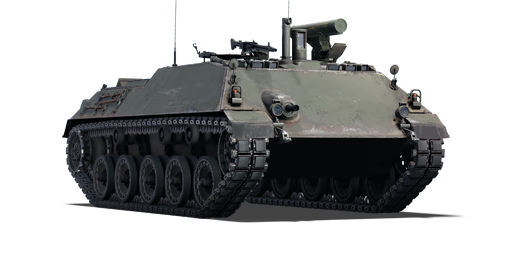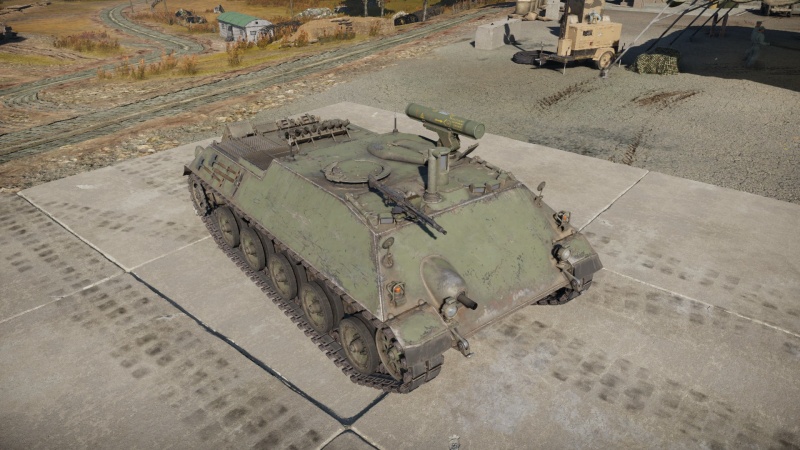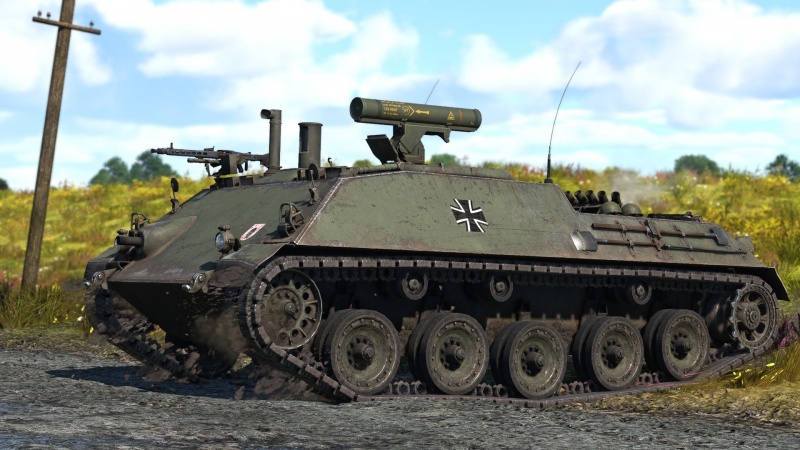RakJPz 2 (HOT)
| This page is about the German tank destroyer RakJPz 2 (HOT). For the other version, see RakJPz 2. |
Contents
Description
The RakJPz 2 (HOT) was a further development of the previous RaketenJagdpanzer 2, mounting the HOT ATGM which used a far superior Semi-Active guidance system (SACLOS) compared to the SS.11's Manual system (MCLOS). The HOT-upgraded RakJPz 2s served until 2005 upgraded up to Jaguar 1A3 standard, while the TOW-equipped Jaguar 2 was retired in 1993, also an upgrade from the RakJPz 2s. The RaketenJagdpanzers operated under a doctrinal plan to engage Soviet armour at ranges of 1.5 to 3 kilometres using their missile armament, which was generally assessed to have higher accuracy than contemporary tank cannons at those ranges on initial deployment. The RakJPz 2 (HOT) and later Jaguar 1/1A3s could be fully NBC protected, as they used an autoloading system which replenished the TOW launchers without human interference.
The Raketenjagdpanzer 2 (HOT) was introduced in Update 1.63 "Desert Hunters". Compared to its predecessor, this variant has an upgraded missile known as the HOT (High Subsonic Optical Remote-Guided, Tube-Launched) that is aimed by simply sticking the gun's sight onto the desired target. Due to its relatively low profile, the Raketenjagdpanzer 2 HOT is able to completely conceal itself behind hills and rocks and fire over them, should the terrain allow it. The ATGM itself is rather stiff, but is generally adequate in mid to long range engagements. The vehicle, however, notably trades away gun depression and launcher swivel range for the HOT ATGM, which limits the vehicle noticeably more when compared to its predecessor, the RakJPz 2.
General info
Survivability and armour
Armour type:
- Rolled homogeneous armour
| Armour | Front | Sides | Rear | Roof |
|---|---|---|---|---|
| Hull | 50 mm (51°) Front glacis 50 mm (54°) Lower glacis |
30 mm (35°) Top 30 mm Bottom |
30 mm (44°) Top 30 mm (41°) Bottom |
10 mm |
| Turret | 20 mm | 20 mm | 20 mm | 20 mm |
Notes:
- Suspension wheels are 15 mm thick while tracks are 20 mm thick.
- Turret has a very low profile, but is very vulnerable
Mobility
| Game Mode | Max Speed (km/h) | Weight (tons) | Engine power (horsepower) | Power-to-weight ratio (hp/ton) | |||
|---|---|---|---|---|---|---|---|
| Forward | Reverse | Stock | Upgraded | Stock | Upgraded | ||
| Arcade | Expression error: Unexpected * operator. | 710 | Expression error: Unexpected round operator. | __.__ | |||
| Realistic | 442 | Expression error: Unexpected round operator. | __.__ | ||||
Modifications and economy
Armaments
Main armament
| HOT-K3S ATGM | Turret rotation speed (°/s) | Reloading rate (seconds) | |||||||||||
|---|---|---|---|---|---|---|---|---|---|---|---|---|---|
| Mode | Capacity | Vertical | Horizontal | Stabilizer | Stock | Upgraded | Full | Expert | Aced | Autoloader | |||
| Arcade | 20 | -5°/+10° | ±15° | - | 22.0 | 30.5 | 37.0 | 40.9 | 43.5 | 10.00 | |||
| Realistic | 14.9 | 17.5 | 21.3 | 23.5 | 25.0 | ||||||||
Ammunition
| Penetration statistics | |||||||
|---|---|---|---|---|---|---|---|
| Ammunition | Type of warhead |
Penetration @ 0° Angle of Attack (mm) | |||||
| 10 m | 100 m | 500 m | 1,000 m | 1,500 m | 2,000 m | ||
| HOT | ATGM | 700 | 700 | 700 | 700 | 700 | 700 |
| Missile details | ||||||||||||
|---|---|---|---|---|---|---|---|---|---|---|---|---|
| Ammunition | Type of warhead |
Velocity (m/s) |
Range (m) |
Projectile mass (kg) |
Fuse delay (m) |
Fuse sensitivity (mm) |
Explosive mass (TNT equivalent) (kg) |
Ricochet | ||||
| 0% | 50% | 100% | ||||||||||
| HOT | ATGM | 250 | 4,000 | 23 | 0.05 | 0.1 | 3.8 | 80° | 82° | 90° | ||
Ammo racks

| Full ammo |
Visual discrepancy |
|---|---|
| 20 | No |
Notes:
- Missiles are modeled individually and disappear after having been shot or loaded.
- Missiles deplete from rack 1 then 2. Rack 3 represents the ATGM launcher.
- The only difference between the two ATGM types is guidance mode (MCLOS vs SACLOS)
Machine guns
| 7.62 mm MG3A1 | ||||
|---|---|---|---|---|
| Mount | Capacity (Belt) | Fire rate | Vertical | Horizontal |
| Pintle | 2,600 (200) | 1,200 | -5°/+25° | ±45° |
Usage in battles
The RaketenJagdpanzer 2 (HOT) is best described as a compromise when compared to its direct predecessor, the RakJPz 2. On one hand, the RakJPz 2 (HOT) gains the SACLOS, high damage HOT ATGM, as is the namesake of the vehicle - but on the other hand, it loses some quality-of-life features the RakJPz 2 had, such as good gun depression, the ability to follow up with a second missile and overall flexibility.
The RakJPz 2 (HOT)'s biggest shortcoming is the aforementioned reduction in gun depression - cutting the vehicle's max gun depression from -10 to -5, and horizontal coverage from 100 degrees per launcher on either side to a singular, left mounted launcher with only 15 degrees of traverse either way. This, unfortunately, severely limits where the RakJPz 2 (HOT) can place itself on the map, as it cannot engage in direct confrontations with enemy MBTs due to its inability to fire on the move and ATGMs taking significantly longer to reach their targets compared to contemporary 100/105 mm shells. Places that Soviet tanks can utilize well (e.g. flat, open areas) are preferred, but also aren't ideal as the vehicle will still be more exposed compared to the RakJPz 2. A tactic that may help is to reverse up a slope instead of trying to crest a slope, but as the missile launcher lacks elevation as well this may not produce favourable results.
It is also to be noted that the HOT, while a faster ATGM, is generally stiffer to control compared to the SS.11s on the RakJPz 2, and as the RakJPz 2 now has access to SACLOS-guided SS.11s as a modification, the utility of the HOT is significantly diminished. It is, however, faster still than SS.11s, and the missile's added penetration does benefit lethality. The ability to take 20 missiles compared to the 14 on the RakJPz 2 is to be noted, as it allows the RakJPz 2 (HOT) to stay in the fight longer, should a good spot be found.
Overall, due to the addition of SACLOS SS.11s to the RakJPz 2 giving it the ability to use mouse-guided ATGMs, the RakJPz 2 (HOT) is unfortunately out of a job, with its main niche completely overtaken by its predecessor. Its lower rate of fire as well as its inability to use many hull-down positions the RakJPz 2 can use, alongside the inability to quickly follow up with a second missile in case of a miss, severely limits its battlefield presence. The vehicle still performs adequately on the same longer range, open maps the RaketenJagdpanzer 2 excelled at, but the overall tradeoffs of the vehicle are generally not worth losing the ability to engage from near impunity behind cover.
Pros and cons
Pros:
- Low profile
- Uses the shared Kanonenjagdpanzer chassis; extremely mobile and low profile
- HOT missile has high penetrating power and adequate speed
- High ammo count (20 ATGMs)
- 7.62 mm MG can be used to remove fences and shrubs obstructing the launcher
Cons:
- Missile is stiff and proves more difficult to compensate for
- Due to initial missile dip/vertical momentum due to where the launcher is positioned, firing from near ridges can end up wasting a missile
- Due to the offset between the gunner's sight and the missile launcher, missiles shot at close targets will be offset to the left.
- Cannot fire on the move, nor is the launcher stabilized
- Lack of gun depression limits the vehicle's versatility heavily
- The launcher's limited firing angles result in constant repositioning - finding ideal positions can be troublesome
- Armour is vulnerable to autocannon fire
- Cannot fully hide the vehicle on most positions due to its lack of gun depression compared to the RakJPz 2
History
Development
In the 1960s, development of a missile carrier acting as a tank destroyer. The result came in 1961 with the Raketenjagdpanzer 1, which features the French SS.11 anti-tank missile. The Raketenjagdpanzer 1 features two mounts for the missiles, but only one is available at a time as while one remains ready to fire, the other is reloading inside the vehicle. The vehicle can hold 10 missiles inside on a Hispano-Suiza HS-30 chassis. The vehicle carried lots of problems with the HS-30 chassis so only a limited amount was made at only 95 vehicles produced from 1961 to 1962. A second version was produced alongside the Jagdpanzer 4-5 between 1963 and 1965, and the two were designed on the same chassis. The finished model was designated the Raketenjagdpanzer 2 and this was accepted into service in 1967 for the German Bundeswehr. The Raketenjagdpanzer 2 was produced from 1967 to 1968 with a total of 318 units produced.
Design
Though slightly larger than the Raketenjagdpanzer 1, the Raketenjagdpanzer 2 had better automotive performances with a newer chassis and using a 500 hp diesel engine and a torsion bar suspension. The new vehicle chassis design allowed for increased missile storage for 14 SS.11 missiles. The Raketenjagdpanzer 2 features two rails for the missiles, both ready to fire and reloads are done automatically by each mount inside the vehicle. The SS.11 missiles allow the vehicle to engage enemy armour up to 3 kilometres away, with the missiles strong enough to take out most Soviet armour at the time. MG3 machine guns were added onto the vehicle for anti-infantry and anti-aircraft defence purposes.
Usage
The German Bundeswehr used the Raketenjagdpanzer 2 from 1967 as far as to the early 2000s. The Raketenjagdpanzer 2's purpose was to engage enemy armour in the ranges between 1.5 to 3 kilometres away, which tank armaments accuracy and power are reduced at the distances. The SS.11 missile's range and lethality made the Raketenjagdpanzer 2 perfect for its role as it could defeat the main Soviet tanks such as the T-54/55 and T-62. The Germans organized the Raketenjagdpanzer 2 in tank destroyer companies attached to Panzergrenadier brigades and Panzer brigades, with eight vehicles per company in the Panzergrenadier brigades and 13 vehicles per company in the Panzer brigades. When the manual-guided SS.11 missiles became obsolete, the Raketenjagdpanzer 2 underwent an upgrade between 1978 and 1982 in armour and in its missile armament from the SS.11 to the HOT (High Subsonic Optical Remote-Guided, Tube-Launched) missiles with improved lethality and guidance system. The upgraded Raketenjagdpanzer 2 was called the Raketenjagdpanzer 2 HOT. This saw an improvement again between 1993 and 1995 when some extra armour, a new optic, and thermal imaging system were installed into the vehicle. This upgrade was called the Raketenjagdpanzer 3 Jaguar 1A3. The Raketenjagdpanzers were retired from the Bundeswehr in 2005 and the Austrian army in 2006, never seeing combat in the Cold War.
Media
- Skins
- Videos
See also
External links
| Germany tank destroyers | |
|---|---|
| Pz. I Derivatives | Panzerjäger I |
| Pz. II Derivatives | 15cm sIG 33 B Sfl |
| Pz. 38(t) Derivatives | Marder III · Marder III H · Jagdpanzer 38(t) |
| Pz. III Derivatives | StuG III A · StuG III F · StuG III G · StuH 42 G |
| Pz. IV Derivatives | Jagdpanzer IV · Panzer IV/70(A) · Panzer IV/70(V) · Dicker Max · Nashorn · Brummbär · VFW |
| Pz. V Derivatives | Jagdpanther G1 · Bfw. Jagdpanther G1 |
| Pz. VI Derivatives | Sturer Emil · Elefant · Ferdinand · 38 cm Sturmmörser · Jagdtiger |
| Wheeled/Half-track | 8,8 cm Flak 37 Sfl. · Sd.Kfz.251/9 · Sd.Kfz.251/10 · Sd.Kfz.251/22 · Sd.Kfz.234/3 · Sd.Kfz.234/4 · 15 cm Pz.W.42 |
| ATGM Carrier | RakJPz 2 · RakJPz 2 (HOT) · Wiesel 1A2 |
| Other | Waffenträger · M109G · JPz 4-5 · Raketenautomat · VT1-2 |






